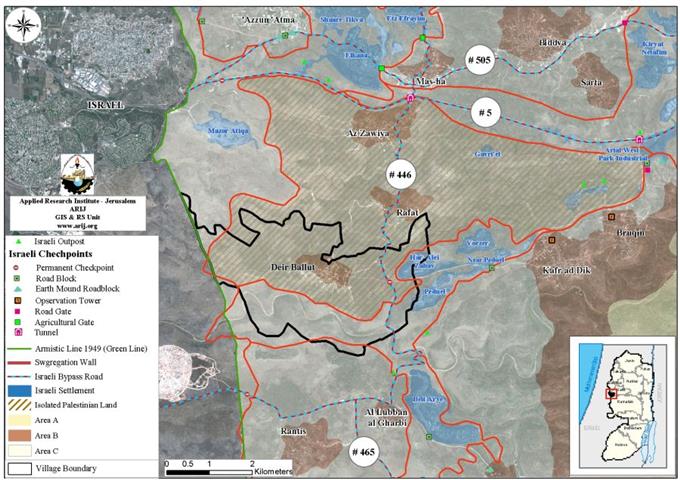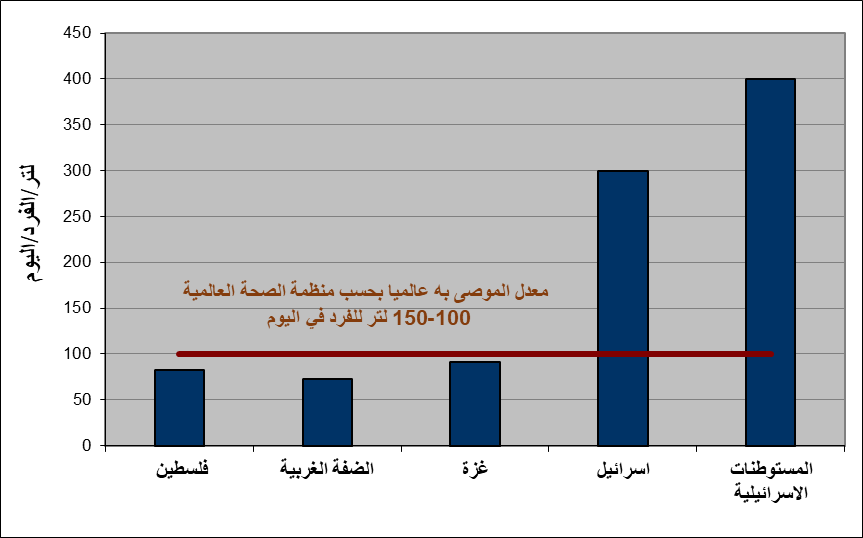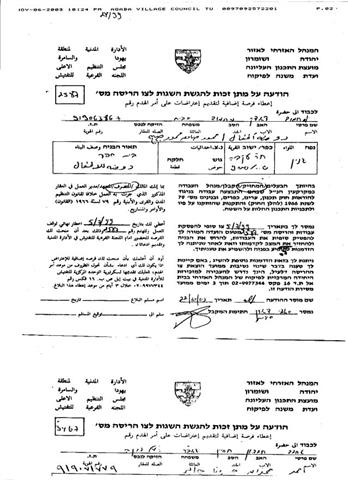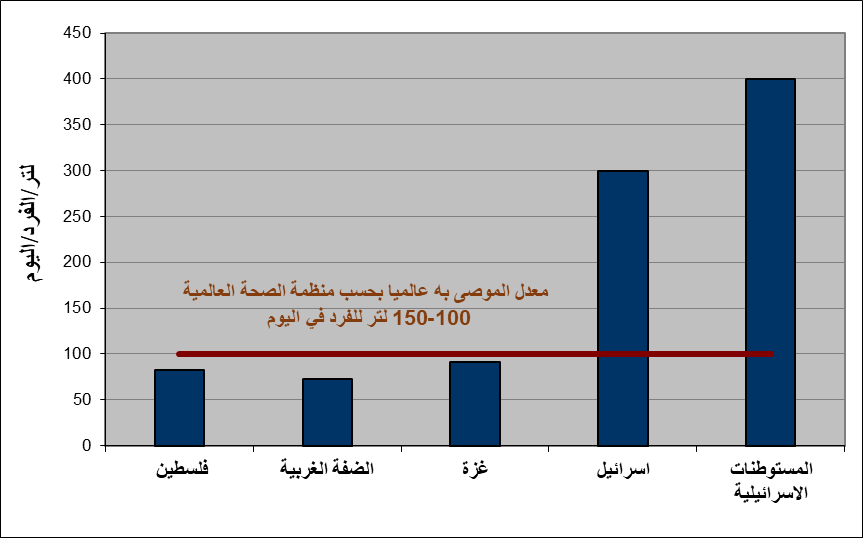The villagers knew any building at the end would be at risk of demolition by the Israeli Army, but the need for a new school rivaled the risk and the village council decided to start building a new school in Deir Ballut village in late 2002. Two more schools exist in the village with 900 students in both of them. The students’ compact classes at the two existing schools are no longer able to deal with the increasing number of students every year.
In June 2003, Deir Ballut village council received the first warning from the Israeli Army to stop constructions at the school for not having the proper licensing from the in-charge Authority. The council filed petition to the court through a lawyer and were able to halt the demolition order under one condition that the constructions of the school be put on hold until the Court issues its ruling in that issue. Since that time, the under-construction school kept its status and no further building was added; On the other hand, the two schools continued to suffer from crowded classes and adopted double- and even triple-shifting education programs in an attempt to evade some of the negative implications caused by such an environment as the number of students continued to rise throughout the previous years.
On February 9, 2008, the Israeli Army handed out Deir Ballut village council another military warning to demolish the under-construction school for the same pretext. The school is located within Area 'B' & 'C' as classified during Oslo II Interim Agreement of September 1995. Area 'B' is were Palestinians have full control over the civil responsibilities while Israel continues to have overriding responsibility for security; and in Area 'C', Palestinians have responsibility only for civil life such as economics, health and education; however, Israel retains full control over security and administration related to territory. In the Israelis minds, this translate that Palestinians have to acquire a license from the nearest Israeli Civil Administration (ICA) for every construction. The impracticality of attaining a building license (permit) is another story, as Palestinians must meet a list of demands set by the ICA to prove ownership of the land where premises are to be constructed.
Over the years, Israel imposed various restrictions on building process carried out in the occupied Palestinian territory. Building in areas that fall outside the master plan of Palestinian towns and villages required and still do; building permit from the Israeli civil administration; otherwise the construction will be subject to demolishing at any time by the Israeli Army. Under international law, the occupying power is not to interfere with issues of civil concerns and is not to demolish property of those occupied unless military necessities demand that they do so.
Land Classification in Deir Ballut Village
Deir Ballut's total land area is 11020 dunums and is classified according to Oslo II Interim Agreement of 1995, into the following:
-
Area B constitutes 5.3 % (585 dunums) of the total village area and holds the urban area in the village.
-
Area C constitutes 94.7% (10435 dunums) of the total village area and includes all the agricultural lands, the open spaces, and all the lands suitable for future expansion.
The village's chance to build and expand in the future is little as the area designated for that purpose is under the Israeli control due to its location in Area C. See Map 1
The Right to education
The systematic obstruction of Palestinian education in the West Bank and the Gaza Strip by the Israeli Occupation violates rights of the individuals to education. It is a right to everyone under the international covenants and human rights of which:
Article 26 of the Universal Declaration of Human Rights states that “everyone has the right to education”. It is even detailed than other rights in the Declaration as it is made up of the following requirements:
-
Education shall be free, at least in the elementary and fundamental stages. Elementary education shall be compulsory. Technical and professional education shall be made generally available and higher education shall be equally accessible to all on the basis of merit;
-
Education shall be directed to the full development of the human personality and to the strengthening of respect for human rights and fundamental freedoms…;
-
Parents have a prior right to choose the kind of education that shall be given to their children.
The right to education is also referred to in a number of international agreements, the most significant of which are:
Article 13 of the International Covenant on Economic, Social and Cultural Rights Covenant, which recognizes Education as 'both a human right in itself and an indispensable means of realizing other human rights'; As an empowerment right, 'education is the primary vehicle by which economically and socially marginalized adults and children can lift themselves out of poverty and obtain the means to participate fully in their communities.'.
Article 5 of the International Convention on the Elimination of All Forms of Racial Discrimination in which it ' States Parties undertake to prohibit and to eliminate racial discrimination in all its forms and to guarantee the right of everyone, without distinction as to race, color, or national or ethnic origin, to equality before the law, notably in the enjoyment of various Rights, including the right of Education
Article 28, section (1) of the Convention on the Rights of the Child, also refer to right to education which recognizes ' the right of the child to education and with a view to achieving this right progressively and on the basis of equal opportunity, they shall, in particular:
-
(a) Make primary education compulsory and available free to all;
-
(b) Encourage the development of different forms of secondary education, including general and vocational education, make them available and accessible to every child, and take appropriate measures such as the introduction of free education and offering financial assistance in case of need;
-
(c) Make higher education accessible to all on the basis of capacity by every appropriate means;
-
(d) Make educational and vocational information and guidance available and accessible to all children;
-
(e) Take measures to encourage regular attendance at schools and the reduction of drop-out rates.
Article 28, section (3): States Parties shall promote and encourage international cooperation in matters relating to education, in particular with a view to contributing to the elimination of ignorance and illiteracy throughout the world and facilitating access to scientific and technical knowledge and modern teaching methods. In this regard, particular account shall be taken of the needs of developing countries.
Prepared by
The Applied Reserach Institute – Jerusalem














